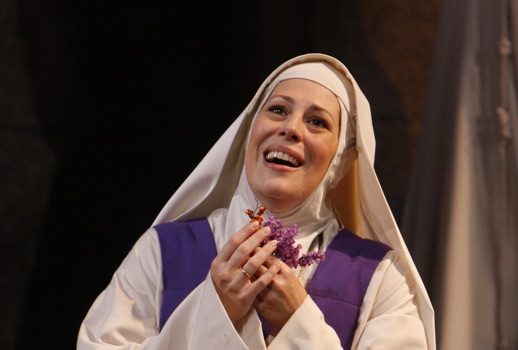

Contemporary reports said of Il tabarro, “Ever since Mascagni brought the barnyard and Leoncavallo the mountebanks to the Italian operatic stage, Puccini himself has weltered in melodrama.”
Suor Angelica fared even worse: “It is almost always metronomic, dull, drilling upon its theme with the persistence of a dentist at a tooth. There is no blood or bone to it, no strength to uphold the nun’s veiling the concept.”
There was some cold comfort in the description of “O mio babbino caro,” the hit tune from Gianni Schicchi: “Here, for once, comes pure melody; melody, indeed, so plaintive and tender as to verge upon the street ballad – yet it is arch and exquisite.”
Perhaps the most devastating overall comment: “The individual and concerted achievements of the performers could not make up for the composer’s lack of spontaneity and inspiration.” My, how times have changed!
While the operas can be given as a showcase for two singers each tackling three leading roles (as did sopranos Renata Scotto and Teresa Stratas at the Met, Beverly Sills at New York City Opera, and contralto Lili Chookasian) and a baritone essaying two (accomplished by Cornell MacNeil), the cast list can approximate that of the Ring Cycle when each work has its own ensemble, the approach taken by the Los Angeles Opera in 2008 in performances led by James Conlon.
Il tabarro features Wagner diva Anja Kampe as Giorgetta, the role which served as the Met debut of another Wagnerian, Hildegard Behrens, in 1976. Yet another singer noted for Wagner interpretations, Mark Delavan, is the cuckolded husband, Michele. Giorgetta’s lover Luigi is sung by Salvatore Licitra, who died after a motor scooter accident in 2011.
For younger visitors to Parterre, it should be noted that Licitra was catapulted to fame when he was literally flown in from Italy at the last minute to replace Luciano Pavarotti in what was to have been his Met farewell as Cavaradossi in 2002, and remained a company favorite between 2005 and five months before his untimely death at age 43.
Renowned as Verdi’s dramatic heroines and Donizetti’s Tudor Queens, Sondra Radvanovsky appears against type as the reclusive nun Angelica. Veteran Russian mezzo Larissa Diadkova is her nemesis, the stone-hearted Principessa.
Devious scoundrel Gianni Schicchi, relegated to the Eighth Circle of Hell by Dante Alighieri in his Inferno, is portrayed by beloved English baritone Thomas Allen. The young lovers Lauretta and Rinuccio are appropriately sung by two artists in their mid-20s: Laura Tatulescu and Saimir Pirgu, both of whom cut their teeth at Wiener Staatsoper and are now enjoying international careers.
The operas are said to be returning to the Met in the 2018/2019 season for their centennial with Kristine Opolais taking on all three heroines.
Giacomo Puccini: Il Trittico
Los Angeles Opera
James Conlon, conductor
06 September 2008
Il Tabarro
Michele – Mark Delavan
Luigi – Salvatore Licitra
Il “Tinca” – Matthew O’Neill
Il “Talpa” – John Del Carlo
Giorgetta – Anja Kampe
La Frugola – Tichina Vaughn
Un venditore di canzonette – Robert MacNeil
Due amanti – Lori Ann Fuller, Daniel Montenegro
Suor Angelica
Suor Angelica – Sondra Radvanovsky
La zia principessa – Larissa Diadkova
La badessa – Ronnita Nicole Miller
La suora zelatrice – Tichina Vaughn
La maestra delle novizie – Catherine Keen
Suor Osmina – Angel Blue
Gianni Schicchi
Gianni Schicchi – Thomas Allen
Lauretta – Laura T?tulescu
Rinuccio – Saimir Pirgu
Zita – Jill Grove
Gherardo – Greg Fedderly
Nella – Rebekah Camm
Gherardino – Sage Ryan
Betto di Signa – Steven Condy
Simone – Andrea Silvestrelli
Marco – Brian Leerhuber
La Ciesca – Lauren McNeese
Maestro Spinelloccio – Levi Hernandez























Comments